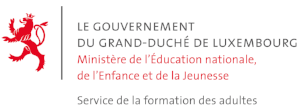CEFR Levels
The Common European Framework of Reference for Languages: Learning, Teaching, Assessment, is a guideline, published by the Council of Europe, which is used to describe achievements of learners of foreign languages across Europe and, increasingly, in other countries. Its main aim is to provide a method of learning, teaching and assessing which applies to all languages in Europe.
A1.1 The main competencies covered in the course
Textbook”Schwätzt Dir Lëtzebuergesch? A1″
Chapter 1
- The basics of saying hello and goodbye
- Saying how you are doing and asking someone how they are doing.
- Introducing yourself in Luxembourgish and asking someone’s name and surname
- Saying where you come from and asking someone about their origins
- Giving information about your nationality and the languages you speak and asking somebody for this information
Chapiter 2
- Giving your phone number to someone else and asking for this information ;
- Saying your age and date of birth and asking questions to get this information;
- Giving your address and asking for someone’s address.
- Saying your email address and asking for someone’s email address
- Talking about your marital status and asking someone about their marital status.
Chapter 3
- Talking about your profession, job, occupation and asking someone else for this information.
- Understanding and describing professional activities
- Saying where you work and asking someone else about their workplace.
- Talking about means of transport.
- Understanding a short job advertisement
- Telling the time and asking for the time.
- miliar subject;
- Get information about leisure activities;
- Understand major titles of newspapers, radio or television broadcasts.
A1.2 The main competencies covered in the course
Chapter 4
- Describing your daily routines
- Talking about your hobbies and free time
- Setting up an appointment
- Talking about the weather
Chapitre 5
- Naming and describing food and drinks
- Having a conversation in a shop
- Saying what food and drinks one likes to eat and to drink
- Ordering food and drinks
Chapitre 6
- Talking about one’s family and friends
- Describing a person
- Having a conversation at a doctor’s
A2.1 The main competencies covered in the course
Textbook”Schwätzt Dir Lëtzebuergesch? A2
Chapter 1
- Giving and asking for information about train and bus timetables.
- Asking the way and understanding directions and instructions on how to reach a destination.
- Naming places in the city and saying what one can do there
- Booking a table in a restaurant.
- Ordering something in a restaurant.
- Talking about the opening times and asking questions about them
Chapitre 2
- Understanding short accommodation advertisements
- Describing and commenting on accommodation
- Talking about household chores
Chapitre 3 (part 1) pages 38-47
- Talking about one’s daily habits and asking about them
- Saying where one is and where one is going
A2.2 The main competencies covered in the course
Chapitre 3 (part 2) pages 48-55
- Asking for information about something and discussing advantages and disadvantages
- Talking about one’s future plans and setting up an appointment
Chapter 4
- Describing and comparing clothes
- Describing a person’s appearance
- Describing a person’s character
- Talking about one’s likes and dislikes
Chapiter 5
- Talking about one’s holidays and free time
- Talking about what one did during the week and last weekend.
- Expressing joy, surprise and compassion in a simple way
- Talking about one’s plans and projects.
- Understanding weather forecasts.
A2.3: The main competencies covered in the course
Chapter 6
- Describing one’s neighbourhood and place of residence
- Describing one’s accommodation and equipment.
- Understanding and expressing a prohibition, an order or a permission
- Giving simple instructions
- Understanding directions and instructions on how to reach a destination
- Describing the way to a destination
Chapter 7
- Having a conversation at a doctor’s
- Describing the symptoms of a disease and asking questions about it
- Giving and asking for advice
- Having a short conversation on the phone
- Understanding voicemail messages and reacting to them.
Chapter 8 Revision
Level B1 :
Textbook “Schwätzt Dir Lëtzebuergesch? B1
B1.1 The main competencies covered in the course
Chapter 1
- Understanding a life story and telling one’s own life story.
- Talking about one’s personal events in the past
- Comparing the lifestyles of people from different cultures
- Comparing the present and past lifestyles.
Chapitre 2
- Making invitations and asking someone to go out
- Declining or accepting someone’s invitation to go out
- Expressing one’s feeling, wishes and refusals in the context of going out
- Communicating on the internet with the help of abbreviations and emojis
- Talking about customs in the context of invitations
Revision chapter
B1.2 The main competencies covered in the course
Chapter 3
- Talking about prevention campaigns
- Expressing recommendations
- Talking about accidents or incidents
- Learning and describing different medical and healthcare professions
- Talking about work-related diseases
- Understanding the key points of the news
Chapitre 4
- Talking about different ways of working
- Discussing the advantages and disadvantages of different jobs
- Describing one’s professional experience
- Talking about one’s professional plans and projects
- Understanding job advertisements and getting ready for a job interview
Revision chapter
B1.3 The main competencies covered in the course
Chapitre 5
- Learning and naming different types of accommodation
- Talking about one’s priorities, the advantages and disadvantages in the context of accommodation.
- Expressing conditions and consequences
- Expressing wishes and hypotheses
- Differentiating suggestions and wishes from polite questions
Chapitre 6
- Getting to know the political system of the country
- Understanding and summarizing a socio-political report.
- Participating in a discussion on a socio-political topic and advocating one’s point of view.
- Agreeing or disagreeing to different statements
- Understanding and expressing different opinions
Revision Chapter
B2: The main competencies covered in the course
- Discussing clearly and in a detailed way a wide range of topics (the news, culture, social and political topics);
- Understanding the news and complex arguments
Spelling – The main competencies covered in the course:
- Learning how to write correctly in Luxembourgish on the basis of the essential grammar and spelling rules
- The complete updated reformed spelling rules of the Luxembourgish language were published in November 2019.


